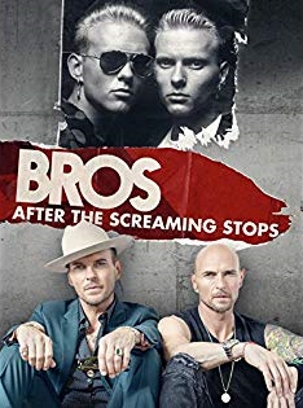After the Screaming Stops: Bros, fame and God
You have to be a certain age to get the pop group Bros. If you're under 30 you've probably never heard of them, if you're much over 50 you probably never cared.
When Bros hit the top of the charts in the late 80s I was a teenager. I was just getting into music and was trying not to be any less popular than I already was, so for me Bros were a shiny, manufactured pop band to be looked down upon even though their songs were undeniably catchy.

Bros were responsible for my favourite ever terrible song lyric – 'I watched you crumble, like a very old wall'. Poetry.
And so it came to pass that over the Christmas holidays a Bros documentary, After the Screaming Stops, found its way onto the BBC iPlayer. My wife tried watching a few minutes and said it was awful. Curious, I put it on and found myself enraptured by its unintentional comedy value.
The documentary shows the band's twin brothers, Matt and Luke, coming back together to perform a reunion concert. It follows their preparations and is interspersed with interviews, which is where the magic is. As the earlier song lyrics show, the boys have their own unique way with words. What comes out is a sort of philosophical commentary on their lives, which at the same time they are trying to describe and fathom. Central to it is their troubled relationship with each other and with fame.
To give you just one example, there is a clip of the brothers together where Matt (the singer) gives the following analysis of their relationship: 'He was a rectangle and I was a rectangle and we made a square, which therefore is a fortress'.
My wife thought that I was being very unkind as I whooped with laughter. More than anything I couldn't get over the parallels with my favourite film – This is Spinal Tap.
Spinal Tap is a spoof film about a dreadful British heavy metal band trying to tour America again. The band wander around in a haze of self-important confusion failing to understand why everything they are doing is going wrong. The fictional 'rockumentary' follows them around and interviews them uncovering their fatal flaws. In a much-quoted sequence, guitarist Nigel Tufnel explains that he has an amp that is louder than other people's because his has been made to go up to 11.
The Bros story felt like a real life, re-make of Spinal Tap with the boys having no idea how daft they sounded. My wife of course had a point – it was cruel to mock them, however easy they were making it. The boys had clearly suffered a lot – they'd been ripped off by their agent, hounded by the press, their sister had died in a car accident at the height of their fame and more recently their much-loved mum had passed away. Now though, they had decided to put it all out there, wearing their hearts on their sleeves and letting people film.
On reflection what felt saddest to me was that for all the difficulties and the ruminations they chose to share with us they didn't really seem to have understood what the biggest problem was – the illusory nature of fame.
Bros' defining hit was the song 'When will I be famous?' They wanted more than musical success, they wanted fame – for their names and faces to be known everywhere. When it happened they found, as many others have, that it was unbearable. Rather than fame being an expression of being liked and popular, it was hype around an image of themselves that they couldn't control.
I wanted to be famous when I was a teenager because I was miserable. Without being able to articulate it, I was looking for something where I would be noticed and significant. Fame of course would not have ever met that need in a healthy way. What we all need is love and attention from people who really know us, who are there even when we mess up and with whose help we can learn when we do.
The documentary felt like it should have been called – 'When will I be famous again?' The brothers were still desperately insecure and in need of affirmation so we had the bizarre spectacle of them greeting fans at the airport, who were holding 30-year-old pictures of them to sign. It's a shame that their talents and relationships hadn't led them to have a more secure base to work from.
In a largely godless age we tend to place things on a plinth to fill the role of God – to be the thing that is able to meet our needs. In the boys' case, fame has been an attempt to do that – but just like the inanimate carved idols of days gone by, it will continue to fail to deliver. It is not the real thing. I hope they can find a place of peace off stage and away from the camera.
My hope for us all is that we can know and live in the love of God that does not depend on our performance or popularity.
'The eternal God is your refuge, and his everlasting arms are under you' (Deuteronomy 33:27).
Dave Luck is the author of 'What Happens Now? A journey through unimaginable loss' and blogs weekly on www.daveluckwrites.co.uk. Follow him on Twitter @dluckwrite or on Facebook at the 'Daveluckwrites' page.











